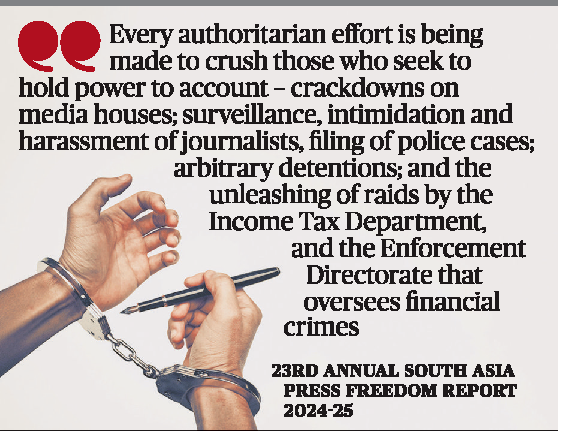23rd South Asia Press Freedom Report (2024–25)

- 12 May 2025
In News:
The 23rd Annual South Asia Press Freedom Report 2024–25, titled “Frontline Democracy: Media and Political Churn”, flags a concerning decline in media freedom across South Asia, including India. Published by the Asia Press Freedom group, the report assesses press conditions in eight countries: India, Pakistan, Afghanistan, Sri Lanka, Bangladesh, Nepal, Bhutan, and the Maldives.
Key Findings
- Over 250 violations of media rights recorded.
- 69 journalists were jailed or detained; 20 killed in the line of duty.
- India ranked 151st globally in press freedom; Bhutan dropped to 152nd—its lowest ever.
- Pakistan witnessed its most violent year for journalists in two decades, with eight killed.
India-Specific Observations
Legal and Institutional Suppression
- Increasing use of stringent laws like UAPA, PMLA, defamation, and sedition against journalists.
- Media organizations critical of the government have faced IT raids, ED investigations, and denial of government advertising.
- These actions have led to widespread self-censorship and a chilling effect on critical reporting.
Disinformation and Political Interference
- Political IT Cells play a key role in spreading fake news and hate speech, deepening the trust deficit in mainstream media.
- The Global Risks Report 2024 identifies “manipulated information” as the world’s most serious short-term threat.
Digital & Economic Challenges
- AI-generated content undermines journalistic credibility and originality.
- Media workforce faces challenges from:
- Declining advertisement revenue
- Contractualisation under new labour codes
- Mergers and corporate restructuring
- Precarity of gig and freelance journalists
Gender Inequality
- Poor representation of women in newsroom leadership roles.
- Pervasive gender-based harassment remains unaddressed.
Impacts of Eroding Media Freedom
- Democratic Deficit: Weakens the role of the press as the fourth pillar of democracy.
- Public Mistrust: Rising perception of media bias and loss of credibility.
- Reduced Information Access: Laws like the DPDP Act 2023 and changes to RTI provisions hinder public transparency.
